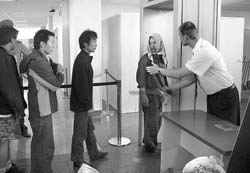Trans-European border
Ukraine reaches agreement with Europe about returning refugees and migrants
For illegal migrants making their way to Europe from Asia and Russia, one of the biggest routes “from the Varangians to the Greeks” crosses Ukraine. Last week politicians held a roundtable to discuss ways to protect the rights of people who find themselves in Ukraine illegally or against their will.
“Our duty is to save Europe from a flood of illegal immigrants,” Hennadii Udovenko, the head of the Committee for Human Rights, Ethnic Minorities, and Interethnic Relations, said at the meeting. “Ukraine has a serious attitude to this flood and realizes that the open border with Russia accounts for most of the problems.”
Mostly we lack funds to manage these migration flows successfully. Taking into account Ukraine’s long-lasting aspirations to simplify the visa regime with the European Union and have closer contact with Europe, which is impossible without a civilized customs control, the EU plans to give Ukraine about 30 million euros to implement a program that is part of the Ukraine-EU readmission agreement concluded in October. However, this sum has not been confirmed and it may change. This money will also be taken from the funds already earmarked for Ukraine.
“These are not additional funds but those that Ukraine has decided to redistribute within the framework of what has already been allocated,” says Ian Boag, head of the EU Delegation to Ukraine. At the same time, 30 million is much more than what we have received from the TACIS program this year. According to Borys Bazylevsky, the director of the consular services department at the Ministry of Foreign Affairs, this money is more than enough for the successful management of migration flows in our state. Next year Ukraine is supposed to receive a total of 120 million euros from various programs of the European community.
Officially, over 3,000 people have crossed Ukraine en route to different countries in the past six years. A decrease in the number of trans-border illegal migrants was noted only in 2006. Turkey was the destination of the biggest flow of illegal migrants crossing Ukraine: over 200 Moldovan nationals in three years. The number of people who illegally crossed the Ukrainian border in the years of independence runs into the millions.
Such a large number of migrants and the complicated return of illegal migrants to their country of origin are some of the major problems in our relations with Western Europe. In the case of our country, readmission concerns the deportation to Ukraine not only of Ukrainians but all individuals who illegally arrived in the EU from the territory of Ukraine. The October agreement envisages that our country will return all illegal European immigrants home to Europe, while Europe will return those who came from our country.
To handle this flow of migrants Ukraine should sign similar readmission agreements with neighboring countries, primarily with Russia. Yesterday Bazylevsky claimed our country’s readiness to sign such a document with the Russian Federation. According to him, Ukraine held fairly successful talks this year, and the decision to return illegal migrants to their countries has undergone all domestic procedures in our country.
Among the important stages of this plan are encouraging the voluntary return of illegal migrants from Ukraine to their countries of origin and the voluntary return to Ukraine from abroad of Ukrainian victims of human trafficking. Those who have ended up in Ukraine are having a hard time because the state has no money to support immigrants and refugees.
One of the acutest problems these people face in Ukraine is inadequate reception points and temporary shelters. There are centers in Odesa but they hardly do their job. Transcarpathia, one of the largest “transshipment bases,” still does not have shelters for refugees and migrants. In other words, there is nowhere and no one to receive, feed, and deport an illegal migrant.
According to Udovenko, Abkhazian and Vietnamese refugees have been living in Ukraine for more than a decade. Although many of them have housing, jobs, and families in Ukraine, they still do not have Ukrainian citizenship even if they want it: fleeing from hostilities, few of them were able to take their passports with them. Ukraine’s foreign ministry and the International Migration Organization have agreed to cooperate in preventing illegal immigration to Ukraine and human trafficking, and to combat these activities. The Committee for Human Rights, Ethnic Minorities, and Interethnic Relations hopes that the authorities will soon amend the current migration law and make it legal for migrants to have adequate conditions during their stay in Ukraine and return home.






